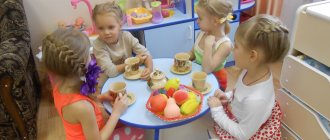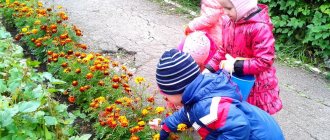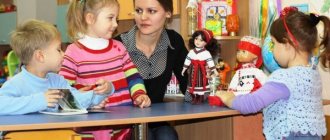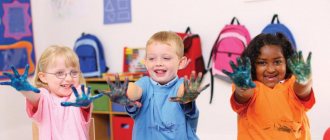Main tasks of preschool education
Kindergarten is the second social institution in a child’s life after the family. Education in kindergarten is aimed primarily at teaching children to live in society, developing the necessary skills of communication and interaction with people around them. For preschool children, communication with peers is a necessary component of harmonious development, because thanks to the developed effect of imitation, learning in a team allows you to master new knowledge and skills much faster. Many parents are frightened by the process of their child’s adaptation to kindergarten. However, the competent behavior of educators makes it possible to smooth out this process and carry it out as painlessly as possible, in contrast to the difficulties that await home children in the school community.
The tasks of preschool education in kindergarten include teaching the basic laws of communication: the child learns to seek a compromise between his desires and the interests of others, to defend his point of view and at the same time be able to restrain himself when resolving disputes. Under the supervision of a teacher, children acquire the first skills of independence, which form the basis for the child’s self-organization at home and, in the future, at school. It is especially valuable that in a children's group all these skills are formed in the most natural way - during play and in the process of communicating with other children.
Of course, kindergarten education does not in any way detract from the value of home education. However, given that modern families rarely have more than one child, kindergarten remains the most accessible source of communication and development in a team.
In addition to getting to know society, the goals of education in kindergarten are the mental, physical, moral and aesthetic development of the child. All these are necessary components for the formation of a full-fledged self-sufficient personality. The teacher’s task is to offer a wide variety of activities that will allow each student in the group to realize their potential. This could be drawing, designing and creating applications, music classes, physical education or gymnastics, and also, additionally, learning a foreign language, choreography and much more. In this way, conditions are created for the development of five basic personal potentials - cognitive, communicative, value-based, artistic and physical.
Areas of development of a preschool child
The four to six year period is the time of the first age crisis in a person’s life. At this age, children begin to rethink their usual life and actively follow the example of their parents and adults. And the main task of the parent at this time is to form in the child a sense of responsibility for the actions he commits. In addition, it is necessary to develop a child according to the following principles:
- Physical education;
- Intellectual;
- Moral;
- Social;
- Labor.
For the correct formation of a healthy personality, education must be carried out according to all principles at once.
Physical education
It is not for nothing that the saying “A healthy mind in a healthy body” is so popular among teachers. Numerous studies have shown that children who are healthy, physically active and have good vitality learn information faster and better. Therefore, physical development is the first area in which it is necessary to raise a child. Teachers recommend:
- Provide your child with a strict daily routine and teach him to adhere to it independently;
- Start the day with exercise and exercise;
- Walk with your child in the fresh air every day, without passing by playgrounds and exercise equipment;
- Provide him with accessories for active recreation: bicycle, scooter, balls, comfortable running shoes;
- When the child reaches the required age, choose a sports section that will not only provide further physical education, but will also please the child.
If initially the parents’ task is to ensure physical development, then by the age of seven the child must take care of it mostly independently. In addition, it is extremely important that the child understands the importance of physical development.
Intellectual
The most important component of psychological education is intellectual development. This is a set of pedagogical actions, the purpose of which is to develop the mind of a growing child through the transfer of experience, knowledge, skills, abilities, as well as the norms of behavior inherent in the generation, rules and assessments.
Depending on the age of the child, intellectual development is divided into stages:
- 1-3 years;
- 4-6 years;
- 6-7 years.
At the beginning of the first or second year of life, the baby’s intellect develops according to the principle of visual and effective thinking. He explores the new world in a tactile, gustatory and olfactory way. The goal of parents at this age is to introduce the baby to new objects and ways to use them.
By the age of four to six years, thinking changes to visual-figurative. While still unfamiliar with any concepts, children create visual images about them. During this period, the most important condition for upbringing and development is a good atmosphere in the family, where parents love and are ready to answer all questions and needs.
After six years, the child’s thinking becomes more playful. During this period, for the purpose of intellectual education, education can be organized in the form of games that promote concentration, imagination and creation: feeding dolls, modeling from plasticine, drawing, board games. In addition to such games, there must be logic games, the purpose of which is to form mathematical functions of brain activity: puzzles. mosaic, constructors.
Moral
Moral education consists of explaining the norms and rules of behavior. Understanding these norms is individual for each parent; we can only recommend ways in which morality is instilled at different ages:
- Until the age of 1 year, children do not understand what is “good” and what is “bad,” and parents can only show them the correct model of behavior by their own example. By showing affection and love, parents cultivate confidence and positive thinking in their child.
- Until the age of 2 years, the main tactics of parents should be to prevent situations in which the child might act “badly” instead of scolding him for it. For example, close the closet instead of scolding the child for getting into it, not going to the store before eating so that he does not eat sweets and does not ask to buy them. Avoid complex disciplinary measures and think ahead.
- Between 2 and 4 years old, children have difficulty understanding abstract things: truth, generosity, support. Give your children real examples, simple metaphors, and firmly stop bad behavior, doing it calmly and kindly.
- Between 4 and 5 years comes the most favorable time for strengthening moral standards. Children already have an excellent understanding of abstract concepts and easily absorb various examples, especially those that are nearby. At this age, kids want to be like the people close to them and make them happy, so well-deserved praise and encouragement motivates them in the best possible way.
- After 6 years, social responsibility begins to develop. At this age, the child needs to be explained that other people have rights that must be respected, as well as set boundaries and rules of behavior in society.
Further work on moral education is carried out after 7 years and here parents are helped, and in certain cases, unfortunately, school, friends and other people interfere.
Social
The process of social education of preschoolers includes the transfer to them of a system of values, norms of behavior and generally accepted knowledge about society, and depends on the culture, nation and characteristics of the place of residence. Moral norms, value orientations and standards of behavior are determined for a child, first of all, by his family, thereby shaping his personality.
The nature of communication among preschool children is non-situational and cognitive: children are interested in many different issues, and speech becomes their main means of communication. The desire of children of this age is to gain knowledge about the world that surrounds them by asking adults questions and observing their behavior. At the same time, one’s own path of knowledge is formed—personal. A child needs to compare himself and other people with each other, so a critical aspect of social education at this age is communication with peers and adults.
It is most convenient to carry out social education within the framework of games: the nature of a child’s actions can say a lot about his temperament and methods of influencing others. By observing him during games, you can identify the pros and cons of your baby's social skills.
Labor
Labor education is another important factor in the development of psychological responsibility. In preschool age, responsibility, skills and desire for work are formed, so it is extremely important to accustom a child to work, starting from 4-5 years. Parents' activities should include the following:
- Assistance in determining work goals;
- Discussion of the labor process;
- Discussion of the morality of work and its purpose: why and for whom it is being done, what it will give;
- Teaching a child how to plan step-by-step activities: how to correctly perform a particular task step by step;
- Awakening interest in work and nourishing it;
- The discussion of the results;
- Encouraging the child’s efforts, interest and desire to work;
- Checking and evaluating the progress of work and its results together with the child;
- Involving a preschooler in a joint labor process;
- Setting the right responsible example;
- Help with advice or deed;
- Awakening the child’s initiative to make decisions and start working.
Labor develops intelligence, attentiveness, memory, concentration and observation in a four to six year old child, and also has a positive effect on health.
Kindergarten education program
There are a great many programs for raising children, and each kindergarten has the right to draw up its own program, but it is necessary to be guided by the requirements set out in the relevant regulations: the Federal Law “On Education”, the Model Regulations on a Preschool Educational Institution and state standards of preschool education.
In modern preschool education, such a Program has become a necessary regulatory document, on the basis of which a license is obtained, accreditation and certification of an institution, as well as the organization of additional paid educational services. The educational program in a kindergarten must justify the chosen methods of education and methods of organizing the educational process and clearly describe the main features of the educational system adopted in this kindergarten.
If a preschool education program is needed in order to formulate the goals and objectives of education, then they are implemented using various methods and technologies. Preschool education technologies make it possible to combine individual techniques and methods into an integral system and organize the upbringing of children in the most rational and effective way. Most often, educational technologies are created by educators directly based on their own experience in raising children, which guarantees the rapid achievement of the desired results.
Today, in many kindergartens, educational technologies are based on well-known educational methods, for example, Montessori, Nikitins, Doman. Each of them is focused primarily on one aspect of the child’s development, so the main task of parents when choosing a kindergarten is to carefully study the educational methods used there and determine for themselves which of the proposed systems best suits the individual characteristics of the child. On the other hand, the task of kindergarten workers is to select a set of methods that will ensure the comprehensive development of children.
The concept and essence of education
Definition 1
Education is a specially organized process aimed at transferring accumulated life experience to the younger generation, forming the correct model of behavior and realizing basic educational goals within the framework of the pedagogical process.
The main goal of education is the cultural, full and comprehensive development of a child capable of physical and spiritual self-development.
Pedagogically properly organized education should encourage the child to personal and cultural growth, self-development, and the desire to develop his spiritual and moral needs and feelings.
The result of upbringing is a full-fledged and harmoniously developed personality, capable of productively existing within the framework of modern society.
Are you an expert in this subject area? We invite you to become the author of the Directory Working Conditions
Education is usually considered from two points of view:
- Education as a social phenomenon is aimed at transmitting historical and cultural experience to the younger generation.
- Education from a pedagogical point of view is aimed at students mastering spiritual and social experiences, values and relationships.
The structure of the educational process is the relationship of its main elements (goal, content, methods, means and results obtained).
The effectiveness of education largely depends on the established developmental interaction between the teacher and students, based on mutual respect and cooperation.
Note 1
Thus, education is a long and continuous process, which over time turns into self-education.
Features of raising children in kindergarten
Raising preschool children is very different from subsequent education at school. Each age has its own laws according to which a child develops. In kindergarten, teachers are faced with a serious and very difficult task: to impart to children all the necessary skills and develop in them all those abilities that are impossible to do without at subsequent stages of development and education. To solve it, it is necessary to find the key for each child, to find the most suitable ways for him to present new information and learning. These can be explanations from the teacher, practical tasks or role-playing games, the main thing is that during the learning process the child has the opportunity to be independent and not just follow the instructions of the teacher. The use of various methods of education in kindergarten allows you to achieve the desired result and take into account the individual characteristics of children in the group.
One of the serious problems of preschool education is continuity between kindergarten and primary school. Traditionally, kindergartens are focused mainly on the general development of the child, while primary schools often place quite high demands on the quality of preschool education, expecting first-graders to possess the skills of mental arithmetic, reading and even writing. In addition, it is believed that schoolchildren are more disciplined and diligent than preschool children. In order to instill in children the necessary qualities, in recent years, raising children in kindergarten often includes special classes to prepare for school. Built according to the scheme of a school lesson, they psychologically prepare children for a new stage of learning. Such activities may include teaching basic arithmetic, writing and reading. At the request of parents and, as a rule, for a fee, the kindergarten management can offer foreign language classes and work with educational computer programs.
Problems of raising preschool children
It is natural that all parents face problems in raising children. Children may not succumb to one or another type of upbringing, may not listen to their parents and act in their own way, which sometimes makes you want to give up. However, in the vast majority of cases, such problems arise due to common mistakes that parents make. Eg:
- Hyperprotection . Excessive care, surrounding the child with hypertrophied attention and parents’ worry about every mistake leads to the development of symbiosis or “interpenetration”. In this case, the relationship between parent and child becomes too close and destroys the latter’s personal qualities and character. This signals the parents’ lack of confidence both in themselves and in the child, about the centralization of his personality as the meaning of his own life.
- Totalitarian authority . Often parents put pressure on their child with multiple demands, a ruthless attitude and uncompromising conditions. For them, the child’s success and society’s opinion of him are more important, while the child’s feelings and desires play a much smaller role. Such children can grow up to be insecure, anxious and suspicious individuals.
- Rejection . Various situations happen in life: divorce, difficult childbirth, violence. Not every parent can cope with problems and not associate their child with bad memories. Rejection is emotional in nature and has dire consequences - a child who is tolerated simply because there is nowhere else to put him, suffers educationally, and receives constant punishment and cruel treatment.
- Indulgence . Hyperprotection is the scourge of modern families, where the interests of all participants depend on the wishes of the child. In such a situation, the ability to sensibly assess the situation and treat both successes and failures adequately is lost. The reason for excessive indulgence is not always a strong love for the baby, but also the unmet needs of the parents themselves.
If there is at least one of the problems described above, it is worth switching from the thought “Why is the child not amenable to education?” to the thought “Why can’t I raise him?” The problem must be solved as quickly as possible and the reasons for its occurrence must be looked for in oneself. And in this case, you should not refuse the help of a psychologist, since the reason may lie very deep.
Share with your friends!
more
Read us in the Zen channel
Basic methods
Preschool education is carried out on the basis of basic methods. There are four large groups of them:
1. Formation of personality consciousness. Here, conversations, stories, conversations, and lectures are most often used. This method is aimed at developing and enriching the consciousness of children, at providing them with extensive knowledge about the world around them. The main tool in this case is the word. The personal example of parents is also very important.
2. Communication, organization of joint activities, gaining experience. Basic tools: exercises, creating educational situations, actions.
3. Methods of motivation and stimulation. Basic tools: encouragement, punishment. This also includes various types of competitive actions.
4. Methods of control, self-control, and self-assessment. At this stage, the child is taught to evaluate himself, to correlate his own actions with the requirements.
With the help of all these methods, the upbringing of children is ensured: the children’s behavior is corrected, personal qualities are formed, and valuable life experience is gained. It must also be said that all of them are aimed at the full development and education of a person as a social unit.
Peculiarities of children's psychology
It is also important for parents to know about the psychology of their children at different stages of development in order to take into account what problems they may encounter.
1. Age 3-4 years. A rather difficult period that requires the patience of parents. An adult must know how to interest a child, how he can be involved in the chosen activity. It is also worth remembering that the desire to do one thing for such guys can quickly disappear.
2. Age 4-6 years. This is a fairly calm period when it is interesting to work with the baby and organize educational lessons. The baby is already old enough to keep his attention on one subject for a long time; he is interested in many things. In addition, the child is almost independent; at this stage he does not require the constant presence of an adult as an observer.
3. Age 6-7 years. The period of active growing up of a child. The child begins to show character and may resist the wishes of the parents. A lot of patience and the ability to negotiate are the main rules for this period of a child’s preschool development.
Labor education
Labor education of children is no less important element than all those described above. No wonder there is such a saying: “Work ennobles.” By doing something with his own hands, the child begins to realize how difficult it is. Also at this time comes an understanding of the value of human labor. It is necessary to encourage the child's very first attempts to help his parents. Even if, for example, washing dishes takes an hour longer, the baby will learn useful skills faster. And the baby will not lose the desire to help his parents (the opposite situation: the child wants to help, but the mother brushes it off, citing lack of time).
Physical education
The physical education of the child is also very important. From a very early age, a child should be taught to exercise moderately. A good place to start is with morning exercises. A child aged three years and older will be happy to repeat simple movements after his parents. You can also harden your child - this will benefit him. And, of course, you need to teach your child to play sports. It is recommended to introduce him to various sports sections, giving preference to those sports in which the child has some success (as well as a desire to practice). Physical education at this stage of life and development plays a very important role, since it is at this time that the foundations of a healthy personality are laid in the child.
Aesthetic education
It is important for parents to remember to focus on aesthetics. You need to teach your child to listen to music, enjoy the sounds of nature, look at the colors in artists’ paintings, and analyze the behavior of fairy-tale heroes and cartoon characters. At this time, it is very important to give maximum explanations to the child on issues that he does not yet understand. And you don’t need to think that it’s too early for a baby at this age to visit an art gallery or a puppet theater. It's about time. This is the only way to develop good taste and proper manners.




